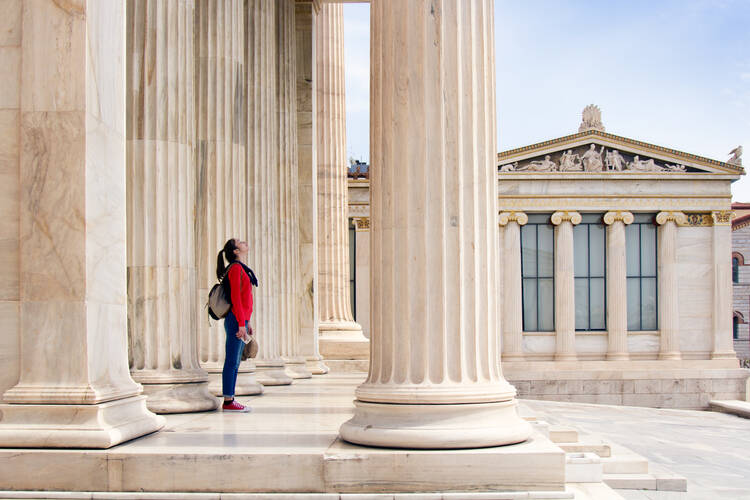Reading about the closures of several philosophy departments has me worried that our centuries-old experiment of liberal arts education is ending. The United States has been trying to transform liberal arts education into pre-professional training for well over a decade, at least since the 2008 recession; and that desire has accelerated, with students and their parents demanding the expansion of programs and majors they believe will lead straight to well-paying, secure jobs.
Consider the jokes about what philosophy majors will do post-graduation. A typical example is a T-shirt that reads, “I have a degree in Philosophy: Why do you want fries with that?” This reveals a pervasive misconception about what philosophy is and what philosophical training prepares its graduates to do.
Philosophy, like any other bachelor’s degree in the liberal arts, prepares graduates for a wide array of jobs, the kind that can lead to more skilled mid-level positions later on. Yet philosophical training seems to be understood as an example of what the philosopher Lisa Heldke calls “stupid knowing,” which classifies someone as more stupid for having gained it. She points to cultural tropes of farmers as unsophisticated laborers whose farming knowledge somehow disqualifies them from higher-order thinking. Philosophy graduates are held to have these higher-order cognitive skills, but at the same time, the possession of those skills is cited as evidence of stupidity: How stupid do you have to be to pursue a “worthless” major that guarantees poverty?
Philosophy prepares graduates for a wide array of jobs, the kind that can lead to more skilled mid-level positions later on.
However, the data suggests that we need more philosophy classes if our students’ employment futures are a prime concern. We know, for example, that philosophy students do extraordinarily well on the GRE, LSAT and GMAT tests, showing that they are well prepared not just for further academic study but also for training in law and business. A study published by the National Bureau of Economic Research in 2017 found that the net return on investment for a philosophy degree is equivalent to that of an engineering degree. Not only is philosophy education less expensive than other forms of education that lead to well-paying, respectable jobs, but philosophy graduates end up earning more over their lifetimes than graduates in any other humanities field and more than graduates of some STEM fields.
The more philosophy graduates demonstrate the falsity of the “useless major” trope, the more deeply entrenched it seems to become. Some have taken the claim “philosophy doesn’t prepare its graduates for any single job” to mean that philosophy leaves its graduates without any job skills. The truth is in between: Philosophy prepares its graduates for many different jobs.
Teaching students to see and assess the range of possibilities in between extremes—including between the horns of a false dilemma—is what I do in my classes each semester. Students arrive in my classes believing that if there is not a single “right answer” to a question, then anything goes. It’s all about feelings, and feelings can’t be wrong. Yet the humanities, and particularly philosophy, prepare students to engage meaningfully with the ambiguities of life outside the classroom, where single right answers are in short supply and where creative problem-solving skills are essential for the difficulties we face.
The humanities, and particularly philosophy, prepare students to engage meaningfully with the ambiguities of life outside the classroom.
In the absence of single right answers, we still can identify many of the wrong answers, and this is one of the ways philosophy proceeds—a lot of philosophical work is clarificatory, aiming to help us learn what does not work and why. This is how the Socratic questioning in Plato’s early dialogues functions. By finding all the faulty definitions of value concepts, we distill what is most central to them. This, in turn, gives us better tools for clarifying our own commitment to the values guiding our lives. Philosophical reasoning does not mean “anything goes”; it is a tool we can use to hone our fuzzy and misshapen values and beliefs about reality.
Freedom from having to find the “right answer” permits the pursuit of answers that, while imperfect, get us closer to figuring out better ways to be. With a deep understanding that not all problems have only one solution, we are better equipped to avoid the perfectionism that can keep us from taking any action whatsoever.
And still: This doesn’t mean that anything goes. That there isn’t a single right answer to some of the problems facing higher education does not mean we are free to do whatever we want; it means that, guided by our values, we are free to imagine new ways of living out those values.
The promises of college and university mission statements—like cultivating in students a thirst for lifelong learning and providing transformative education—depend heavily on the skills promoted by a liberal arts education. This includes such “soft” skills as:
- discerning what is worthy of respect in social, moral and political opinions different from the ones you hold;
- understanding why multiple positions or potential solutions to a problem may all be strong (or weak), even when they are very different;
- reflecting on the extent to which our thinking may be biased and developing methods for reasoning well even as we know we can never be fully free from bias.
If more schools were more willing to live up to their mission statements, rather than rejecting them because in tough times “all bets are off,” we would see a doubling-down on the fields that constitute the liberal arts—all of them. And we would be continually training ourselves to teach our students how and why liberal arts education prepares them for the ambiguity they will face beyond the classroom.









